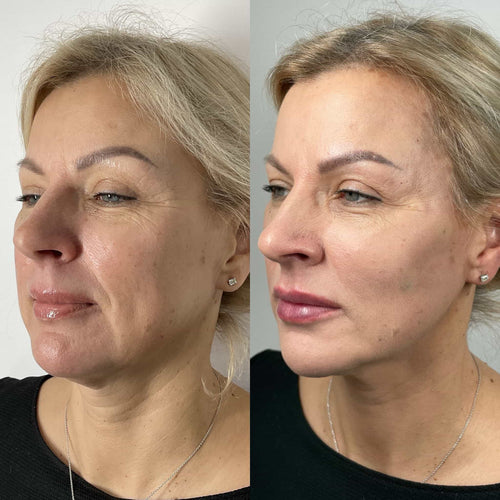Book a Dermal Filler Appointment with Dr. Laura Geige Now
Home Remedies
Nasal Saline Rinse
Nasal inflammation can be uncomfortable and disruptive, but there are several home remedies that can help alleviate symptoms.
One of the most effective options is a nasal saline rinse.
Here’s how to make your own:
-
Boil one cup of distilled water and let it cool slightly.
-
Dissolve 1/4 teaspoon of salt (non-iodized) in the cooled water.
-
You can also add a pinch of baking soda if desired, which can help neutralize acids in mucus.
To use the rinse:
-
Tilt your head over a sink and gently insert the tip of the neti pot or bulb syringe into one nostril.
-
Slowly pour the saline solution into your nostril until it flows out the other side.
-
Repeat on the other nostril.
You can use a neti pot, bulb syringe, or even a squeeze bottle for this rinse.
Nasal saline rinses help to:
-
Flush out irritants and allergens.
-
Thin mucus, making it easier to drain.
-
Reduce inflammation in the nasal passages.
It is important to use distilled or sterile water for nasal rinses to avoid introducing bacteria into your sinuses.
Hydration

Nose inflammation, also known as rhinitis, can be a real nuisance. While there are many over-the-counter and prescription medications to treat it, home remedies can often provide relief for mild cases.
One of the most important things you can do is stay hydrated. Drinking plenty of fluids helps thin mucus, making it easier to drain. Warm water with lemon and honey can be especially soothing.
A humidifier or taking a hot shower can also add moisture to the air, helping to reduce inflammation. Saline nasal sprays or rinses can flush out irritants and allergens from your nasal passages.
Using a neti pot according to instructions can be effective in clearing congestion.
Applying a warm compress to the bridge of your nose can help alleviate pain and pressure.
Avoiding triggers like dust, pollen, smoke, and pet dander is crucial for preventing further inflammation.
If your symptoms are severe or don’t improve with home remedies, it’s essential to consult a doctor to rule out any underlying medical conditions.
Warm Compress
Warm compresses can be incredibly soothing for nasal inflammation.
To use a warm compress, simply soak a clean cloth in warm water (not hot) and wring out excess moisture. Apply the warm cloth to your forehead and the bridge of your nose for 10-15 minutes at a time.
The warmth helps to increase blood flow to the area, which can reduce swelling and discomfort.
You can repeat this several times a day as needed.
In addition to warm compresses, other home remedies that may help with nasal inflammation include:
• **Saline rinses:** Rinsing your nasal passages with a saline solution can help to clear out mucus and irritants. You can purchase pre-made saline solutions or make your own by dissolving 1/4 teaspoon of salt in 8 ounces of warm water.
• **Hydration:** Drinking plenty of fluids, especially water, can help to thin mucus and make it easier to drain.
• **Steam inhalation:** Inhaling steam from a hot shower or bowl of hot water can help to loosen mucus and relieve congestion.
• **Humidifier:** Using a humidifier can add moisture to the air, which can help to soothe irritated nasal tissues.
If your nasal inflammation is severe or persistent, it’s important to see a doctor to rule out any underlying medical conditions.
Medications
Decongestants
Nasal congestion, or a stuffy nose, can be extremely uncomfortable. Decongestants are commonly used to relieve this symptom, but understanding how they work and their potential side effects is crucial.
Decongestants come in two main types:
-
Oral decongestants: These medications are taken by mouth and work systemically throughout the body. They shrink swollen blood vessels in the nasal passages, reducing congestion. Examples include pseudoephedrine (Sudafed) and phenylephrine (Neo-Synephrine).
-
Nasal decongestants: These come as sprays or drops that are applied directly into the nose. They also shrink blood vessels in the nasal passages, providing quick relief from congestion. Oxymetazoline (Afrin) and phenylephrine (Neo-Synephrine Nasal Spray) are common examples.
It’s important to note that prolonged use of nasal decongestants can lead to rebound congestion. This means your nose may become even more congested after you stop using the medication.
Here are some tips for using decongestants safely and effectively:
-
Follow the instructions on the label carefully.
-
Do not exceed the recommended dosage.
-
Use nasal sprays only for a short period (usually 3 days or less).
-
Talk to your doctor before using decongestants if you have high blood pressure, heart disease, diabetes, or glaucoma.
If your nasal inflammation persists or worsens, it’s essential to consult a healthcare professional. They can help determine the underlying cause and recommend the most appropriate treatment.
Antihistamines
Nasal inflammation, often associated with conditions like allergies or sinusitis, can be quite bothersome. Antihistamines are frequently recommended as a first-line treatment for allergy-induced nasal inflammation.
Here’s how they work and what you should know:
-
Mechanism of Action: Antihistamines block the action of histamine, a chemical released by your body during an allergic reaction. Histamine is responsible for many allergy symptoms, including nasal congestion, sneezing, itching, and watery eyes.
-
Types of Antihistamines: There are two main types:
-
First-generation antihistamines: These include drugs like diphenhydramine (Benadryl) and chlorpheniramine. They tend to cause more drowsiness as a side effect.
-
Second-generation antihistamines: These include cetirizine (Zyrtec), fexofenadine (Allegra), and loratadine (Claritin). They are less likely to cause drowsiness.
-
-
Over-the-Counter Availability: Most antihistamines are available over the counter, but it’s always a good idea to consult with your doctor or pharmacist for guidance on which one is right for you.
-
Effectiveness: Antihistamines can be very effective in relieving allergy-related nasal inflammation. However, they may not work as well for other causes of nasal inflammation, such as a cold or infection.
If your nasal inflammation is severe or doesn’t improve with antihistamines, it’s important to see a doctor to determine the underlying cause and discuss further treatment options.
Steroid Nasal Sprays
Nasal inflammation, also known as rhinitis, can be caused by a variety of factors including allergies, infections, and irritants. Steroid nasal sprays are a common treatment option for reducing inflammation in the nasal passages.
These medications work by suppressing the immune system’s response in the nose, which reduces swelling and mucus production. They come in both prescription and over-the-counter varieties.
Some popular brands include Fluticasone (Flonase), Mometasone (Nasonex), and Triamcinolone (Nasacort).
Steroid nasal sprays are generally safe for most people, but there can be some side effects. These may include nosebleeds, dry nasal passages, headache, and sore throat.
It’s important to note that steroid nasal sprays should not be used as a first-line treatment for acute infections like colds or the flu. They work best for long-term management of chronic nasal inflammation.
If you’re considering using a steroid nasal spray, talk to your doctor about whether it’s right for you and get guidance on the appropriate dosage and duration of use.
They can also help rule out other underlying conditions that may be contributing to your nasal inflammation.
When to See a Doctor
Persistent Symptoms
Persistent nasal inflammation can be a frustrating and uncomfortable experience.
While some home remedies might offer temporary relief, it’s important to know when to seek professional medical attention. Here are some signs that you should see a doctor about your persistent nasal inflammation:
- Symptoms Lasting More Than 10 Days: If your nasal inflammation persists for more than 10 days, or if symptoms worsen despite home care, it’s time to consult a doctor.
- Severe Symptoms: Severe nasal congestion, thick green or yellow mucus, facial pain, fever, or difficulty breathing warrant immediate medical attention.
- Recurring Inflammation: If you experience frequent episodes of nasal inflammation, there may be an underlying cause that needs to be addressed by a healthcare professional.
- Other Symptoms: Nasal inflammation accompanied by symptoms like wheezing, coughing, skin rash, or joint pain could indicate a more serious condition requiring medical evaluation.
A doctor can help determine the underlying cause of your nasal inflammation and recommend the appropriate treatment.
This may include:
- Medications: Antihistamines, decongestants, corticosteroids, or antibiotics may be prescribed depending on the cause of inflammation.
- Allergy Testing:**
- Other Treatments: Saline nasal rinses, humidifiers, and lifestyle modifications may also be recommended as part of a comprehensive treatment plan.
If allergies are suspected as a trigger, allergy testing can help identify specific allergens that need to be avoided.
Don’t hesitate to seek medical advice if your nasal inflammation is persistent or bothersome. Early diagnosis and treatment can help prevent complications and improve your overall health.
Severe Symptoms
It’s understandable to want relief from nasal inflammation, but it’s important to know when a home care approach isn’t enough and medical attention is needed.
While many cases of nasal inflammation resolve on their own, it’s crucial to seek medical advice if you experience any severe symptoms or your condition doesn’t improve within a reasonable timeframe.
Here are some warning signs that indicate you should see a doctor about your nasal inflammation:
-
Severe pain or discomfort: If you experience intense facial pain, pressure, or tenderness, it could signal a more serious infection.
-
High fever: A fever exceeding 102°F (38.9°C) accompanying nasal inflammation is often indicative of a bacterial infection and requires medical attention.
-
Thick, discolored nasal discharge: Yellow or green mucus could suggest an infection that needs antibiotic treatment.
-
Difficulty breathing through your nose: Nasal obstruction that severely impacts your ability to breathe normally warrants a doctor’s visit.
-
Spread of symptoms: If you experience swollen lymph nodes in your neck, headache, or fatigue alongside nasal inflammation, it could indicate a systemic infection requiring medical evaluation.
Additionally, consult a doctor if:
Reserve a Dermal Filler Consultation with Dr. Laura Geige
-
You have underlying health conditions: People with diabetes, asthma, or weakened immune systems are more susceptible to complications from nasal inflammation.
-
Your symptoms persist for more than 10 days: While mild cases can often resolve on their own within a week, persistent inflammation may require medical intervention.
Remember, seeking prompt medical attention can help prevent complications and ensure you receive appropriate treatment for your nasal inflammation.
Underlying Conditions
Determining when to see a doctor for nasal inflammation depends on various factors, including the severity, duration, and underlying causes.
Generally, if your symptoms are mild and resolve within a few days, home remedies may suffice. However, consult a doctor if:
– Your nasal congestion lasts longer than 10 days
– You experience thick, discolored mucus (yellow or green)
– You have facial pain or swelling
– You have difficulty breathing through your nose
Get Started with Dermal Fillers – Consult Dr. Laura Geige
– Your symptoms are accompanied by fever, cough, or earache
– You have a history of chronic nasal issues.
Underlying conditions can contribute to nasal inflammation.
These include:
Allergies: Common triggers like pollen, dust mites, and pet dander can cause allergic rhinitis, leading to inflamed nasal passages.
Chronic Sinusitis: This involves persistent inflammation of the sinuses, often caused by infections or allergies.
Vasomotor Rhinitis: Non-allergic rhinitis triggered by factors like temperature changes, odors, and irritants can cause nasal inflammation.
Polyps: These noncancerous growths in the nasal passages can obstruct airflow and lead to inflammation.
Deviated Septum: A crooked nasal septum can disrupt airflow and increase the risk of infection and inflammation.
It’s crucial to consult a doctor for proper diagnosis and treatment if you suspect an underlying condition is contributing to your nasal inflammation.
Pets R4U Dr. Nerina Muses Pretty Little Answers The First Come First Served
- Klarissa Munz: Visionary Artist, Web Developer, and Wife of Freddie Highmore - May 8, 2025
- Can Lip Fillers Remove Deep Wrinkles Around The Mouth - May 4, 2025
- Botox Upper Face Wrinkles In Hampstead, London - May 3, 2025
